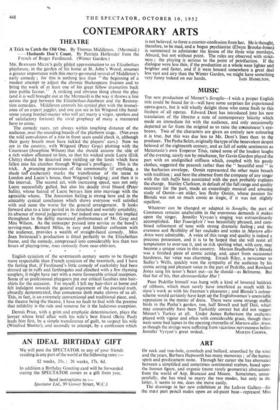CONTEMPORARY ARTS
THEATRE
MR. BERNARD MILES'S gaily gilded approximation to an Elizabethan playhouse, in the garden of his home at St. John's Wood, assumes a greater importance with this merry-go-round revival of Middleton's early comedy ; for this is nothing less than " the beginning of a modest attempt to adjust the chronic Shakespeare fixation and to bring the work of at least one of his great fellow dramatists back into public favour." A striking and obvious thing about the play (and it is well brought out at the Mermaid) is the way it throws a line across the gap between the Elizabethan-Jacobean and the Restora- tion comedies. Middleton controls his cynical plot with the insouci- ance of an expert juggler, and one can see in his Witgood (the hand- some young brothel-master who will yet marry a virgin, spotless and of satisfactory fortune) the vivid prophecy of many a mannered hero to come.
The comedy races, yet always within touching distance of the audience, over the sounding boards of the platform stage. (Not even the wild convulsions of a trio in front seats could check it, although their gusty breath must have tickled the players' ears.) Now we are in the country, with Witgood (Peter Gray) plotting with the Courtesan (Josephine Wilson) that she should assume the role of a rich widow affianced to him, so that his wicked uncle Lucre (Erik Chitty) should be deceived into yielding up the lands which have fallen into his clutches through Witgood's profligacy. This is the trick. &prancing procession of the commonalty (if anything, a shade to3 exuberant) marks the transference of the scene to London and Lucre's house, then Witgood's lodging ; and then it is the interval. The second act, with increasing speed, sees not only Lucre successfully gulled, but also his deadly rival Hoard (Peter Sallis), whose hatred of Lucre betrays him into marriage with the agreeable whore. The Jonsonian feelingis strong here and in the amicably cynical conclusion which shows everyone well satisfied with and none the worse for the general arrangement. It looks forward also to a later period in its detached and worldly amiability, its absence of moral judgement ; but indeed one can see this implied throughout in the deftly mannered performances of Mr. Gray and Miss Wilson. As the innkeeper pressed into service as the bawd's serving-man, Bernard Miles, in easy and familiar collusion with the audience, provides a wealth of straight-faced comedy. Miss Joan Swinstead's production is fitted perfectly to the Elizabethan frame, and the comedy, compressed into considerably less than two hours of playing-time, rises riotously from near-oblivion.
* * English cynicism of the seventeenth century seems to be thought more respectable than French cynicism of the twentieth, and I have the feeling that, if Ferdinand's little comedy of cuckoldry had been dressed up in ruffs and farthingales and clinched with a few rhyming couplets, it might have met with a more favourable critical reception. Some of us professional playgoers put our critical faculties into hair- shirts for the occasion. For myself, I left my hair-shirt at home and felt indulgent towards the general enjoyment of the poetical truth, absurdly demonstrated, that conscience doth make clowns of us all. This, in fact, is an extremely conventional and traditional piece, and, the theatre being the theatre, I have no fault to find with the premise that infidelity is the rule and remorse for it the ludicrous exception.
Dennis Price, with a grim and emphatic determination, plays the lawyer whose brief affair with his wife's best friend (Betty Paul) leads him first, by a simple transference of guilt, to suspect his wife (Winifred Shotter), and secondly to attempt, by a confession which is not believed, to force a counter-confession from her. He is thought, therefore, to be mad, and a bogus psychiatrist (Elwyn Brooke-Jones) is summoned to administer the lesson of the three wise monkeys. Absurd, but not without point. The rules are observed with strict- ness ; the playing is serious to the point of petrifaction. If the dialogue were less thin, if the production as a whole were lighter and brighter and faster, and if it were housed somewhere a great deal less vast and airy than the Winter Garden, we might have something


































 Previous page
Previous page